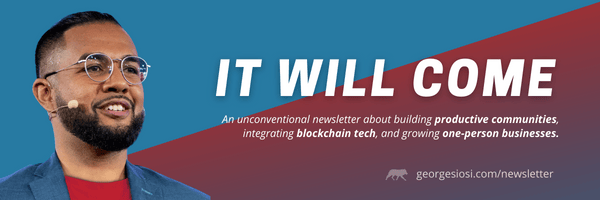- Micro Empires
- Posts
- Rhetoric & Civil Discourse
Rhetoric & Civil Discourse
#092

Heya 👋
So yesterday I shared a post about Notion, UTXOs & Platform Decoupling. Today I'm going to cover how I'm keeping myself focused with the goal of becoming a better writer. Tomorrow, I'll be sharing how this ties in with my Polynesian ancestry - specifically the role of O le Tulāfale ("the Orator" in Samoan).
Sidenote: If you missed Sunday's recap, I shared 9 lessons learned over 90 days of consistent writing, which may help give you more context to my why (despite being in the blockchain space).
So yesterday, I signed up for a Harvard course online called Rhetoric: The Art of Persuasive Writing and Public Speaking, which was inspired by a tweet I stumbled across.
Rhetoric (aka discourse) is the art of speaking or writing effectively, such as:
(a) The study of principles and rules of composition formulated by critics of ancient times.(b) The study of writing or speaking as a means of communication or persuasion(c) Skill in the effective use of speech
I joined the course because, as mentioned, one of my goals is to become a better writer. And the reason for this is that I've noticed leaders I admire have a strong grasp of communication - from writing to speaking.
However, although I've been enjoying writing daily, I realized that I'd benefit from more focused critiques (so I can actually improve).
To date, I've just been writing. And although I've received good feedback, I know there's room for improvement.
They talk about why rhetoric is more important than ever in the course. Mainly because of the decline in standards and even accepted "truths" (e.g. fake news, misinformation, etc.). And if you're familiar with Twitter, you'll see how people get argumentative without even knowing much about what they're talking about.
By understanding how to engage in civil discourse, the theory is that a society can have more constructive debates than emotional or irrational ones. We can also start to respect "expertise" again - or at least where it matters (because, as we know, experts can get things wrong too). This latter part is covered thoroughly in a book brought to my attention yesterday, The Death of Expertise by Tom Nichols.
In the past, I've often failed to complete online courses, mostly because they were "nice-to-haves." However, since my current goal is clearer (and is tied to a future identity), I find myself having a lot more intrinsic motivation to get it completed.
Is there a course you've been meaning to get to but haven't for whatever reason? What's stopping you from getting started today?
Until tomorrow, remember: it will come.
Subscribe to Premium to read the rest.
Become a paying subscriber of Premium to get access to this post and other subscriber-only content.
Already a paying subscriber? Sign In.
A subscription gets you:
- • Exclusive bonus content for members-only
- • Behind-the-scenes of building this newsletter & related businesses
- • Personal insights from dreams, visions & meditations
